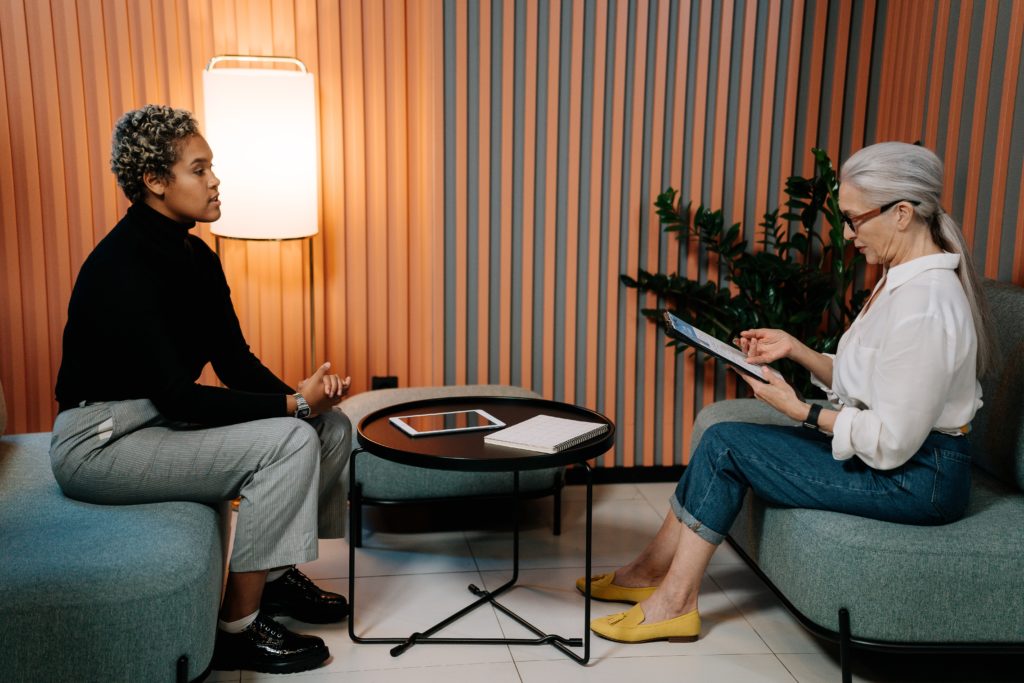After compiling a CV or completing an application form, interviews are the final step to gaining that dream job.
The interview process is a two-way street. It is so an employer can get the opportunity to see if what you have written in your application is borne out by the individual (can you do in real life what you say you can on paper?) but it is also so you can get a feel for the company you may be working for and that the role is right for you (again, is the job going to be as advertised – the hours and expectations of the role haven’t changed?)
Interviews are an unnatural process where it is quite normal to feel nervous. Don’t worry. A good recruiting officer will know that applicants are out of their comfort zones and will make allowances. However, the best way to allay nerves is to make sure you prepare adequately.
If you want help or support in preparing for an interview, contact us via our booking page, below are a few pointers to help with the interview process.
Most interviews are marked against a scoring matrix to ensure all candidates are viewed fairly. This means that for each question the recruiter will be looking for reference to particular elements in the answer – understanding the reason for the question is equally important as the answer you give.
1 – Prepare for the First Question
When feeling under pressure or nervous we may behave in many weird and wonderful ways. The most common first question in an interview is ‘Tell us a little bit about yourself?’. This is a warm up question to help the candidate relax by talking about a subject they should already know i.e. themselves.
TIP – Don’t go way back and talk about your Primary school etc. The question isn’t ‘Tell us your life history’ but unfortunately this is what some people do. Prepare a statement that focuses briefly on your personal circumstances (your family, if you have pets etc. and your hobbies,) but also include your past work history (if you have one) and the skills you have developed, what your passions are and what motivates you and want to achieve in your future. The trick is to balance the personal information with showing what type of person you are.
The first question is rarely viewed as a ‘scoring’ question i.e. it isn’t marked on the scoring matrix however a strong answer to the first question sets up the interviewers’ mindset in a totally different way.
2/ Do Your Research
Know what type of job role you are being interviewed for. If it is retail, expect questions about customer service, if it is warehouse, expect questions around accuracy etc.
Read the job description to get an understanding of what is required. Spend time doing internet research on the type of questions you may be asked and prepare responses. Try not to memorise responses word for word but gain an understanding why a question is asked and what they are looking for in your response.
Research the company -Again, if you have internet access, check out the company. Find out what you can about them. You do not need to know every little detail on their Wikipedia entry, but know the basics. When did they start operations? How many employees do they have? What does their business do? Etc. Show you have an interest in getting this role and you know for whom you will be working.
Interviewers are assessing your work ethic as well as your knowledge (or the potential you can offer). An individual that has researched the role and the company is evidencing their work ethic. You may be surprised that many will not do a basic search so you will already stand out from the crowd!
It is quite a common question
3 – Prepare for Questions
There are standard questions to prepare for. The list below is just to get you thinking.
Tell us about yourself and why have you applied for this role?
What do you know about this role?
Can you give an example of….?
- When you have worked as part of team?
- When you have provided exemplary customer service?
- When you have had to deal with a difficult situation?
What is your greatest strength?
What do you feel is your greatest weakness? (don’t fall foul of giving a weakness i.e. “I have poor timekeeping”. Think of a weakness that could actually be a strength. “I always help colleagues in need which means I can put pressure on myself to complete my tasks”.)
Again, use the internet to get example questions of what may be asked, (i.e. search for questions asked at a retail interview, questions asked during a warehouse interview etc.)
Internet search: “Sample interview questions for ……<insert job role here>”
4 – Interview Techniques
There are a number of interview techniques by recruiter and our advisers are happy to support you with these different approaches.
One of the most common interview techniques is called S.T.A.R
When an interviewer asks a question there is a structure that you can apply to your answer to make sure your response covers the important elements of the question.
Situation – Set the scene for the interviewer– what was the issue or situation to be resolved?
Task – What actions did your think you would have to undertake? Or what had you been asked you to do?
Action – What actions did you take? What did you actually do?
Result – What was the outcome?
In answering in the above format you can clearly tell an interviewer about your experiences, your attitude in completing tasks and also your ability. It can take time and practice but those that answer questions with a structured response tend to do better in interviews.
Contact us to support you with your interview techniques. Book an appointment here.
5 – Prepare Questions for the Interviewers
At the end of the interview there is always the opportunity to ask the interviewers any questions. Always have a few prepared questions. There is no set template here but there are some things to stay away from.
DO NOT ASK
What is the pay? – you should know this already
What are the holiday entitlements? – again, you should know this already
Anything that is about you and what you get from being in the job
DO ASK
When are they looking for somebody to start?
How often do they recruit for this position?
How long do people usually stay in the position you are being interviewed for?
Does the company offer training opportunities and career progression?
If you are successful and get the job, what does the interviewer think your immediate challenge would be?
Again, the internet is a rich resource of post interview questions.
6 – Dress to Impress
Do not underestimate the power of first impressions. Think about the first time you have met somebody (or they met you.)
What did you think of them?
Did you like them/dislike them?
Why was this?
Did your opinion of them change once you got to know them?
Do you ever think of how they thought of you?
- Be clean (especially finger nails)
- Be smart – ironed clothes – polished shoes. You don’t need to go to an interview in evening wear, just be presentable
- Give yourself enough time to dress in the morning
7 – Prepare – Prepare- Prepare
Spend time in preparing everything. Do not leave anything to the last minute. Where is the interview? How are you going to get there? What are you going to wear? What is the name of the interviewers? Do you know the job spec? Have you checked what type of questions you will be asked? Etc.
REMEMBER: Just because you have practiced and prepared does not mean you will get the job, but it does give you a good chance. Interviewers will know who has prepared and who hasn’t. It is not (or it shouldn’t be) a popularity contest.
REMEMBER: Interviews can make anybody nervous – there is no harm in saying you are nervous at the beginning, but try not to keep repeating it. The interviewers will know and should allow for nerves.
REMEMBER: Most interviews conducted will end in disappointment – there may only be one vacancy for which multiple candidates have been interviewed
If you are unsuccessful then look at how to improve. Always ask for interview feedback – Never accept the stock answer of ‘Somebody was more experienced’ or ‘Somebody just interviewed better’. That doesn’t help you. Ask them for specific feedback on where you can improve. Do not take what they say as direct criticism of you, it is just how you interviewed. Always look at how you can improve.
Imagine if you failed a test but weren’t told what you failed on. You then have to sit the same test. The chances are you would give the same answers. Do you think you will pass this time?
When you receive feedback make sure you take note and work on improving.
Need more help?
A team of qualified staff are waiting to support you. Get in touch using the link below.





